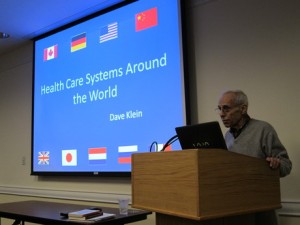
The subject was “Health Care Systems Around the World.” The speaker was David Klein, neurosurgeon and Carolina Meadows resident. The occasion was the World Affairs lecture on March 30. The program was especially timely as it was the week the U.S. Supreme Court spent three days reviewing the constitutionality of the Affordable Care Act, commonly known as Obamacare.
Dr. Klein presented a comparison of the current U.S. health care program and its results to the nationalized health care programs in other industrialized nations including Australia, Canada, France, Germany, Italy, Japan, Norway, Sweden, and U.K. The U.S. is the only industrialized nation which does not have a program of universal health coverage.
U.S. expenditures on medical care are the highest percentage of GDP (16% in 2007) for any of these nations. This compares to 8.2% for Japan and 10.2% for Germany. We also have the lowest life expectancy and highest infant mortality rates of any of these countries. An important contributor to the poor U.S. performance is the sizable number of U.S. citizens (15%) without health care coverage.
Funding for the health care programs in the industrialized nations varies: payroll deduction and employer contributions fund the programs in Germany, France, Japan and The Netherlands; taxes fund the programs in Canada, U.K., Italy, Spain and Scandinavia.
Dr. Klein suggested that all of these programs have some problems. Long waits are common and frills are limited, but each of them ultimately survived and evolved into broad acceptance. In many cases they have become a symbol of national pride.
By John Modisett
